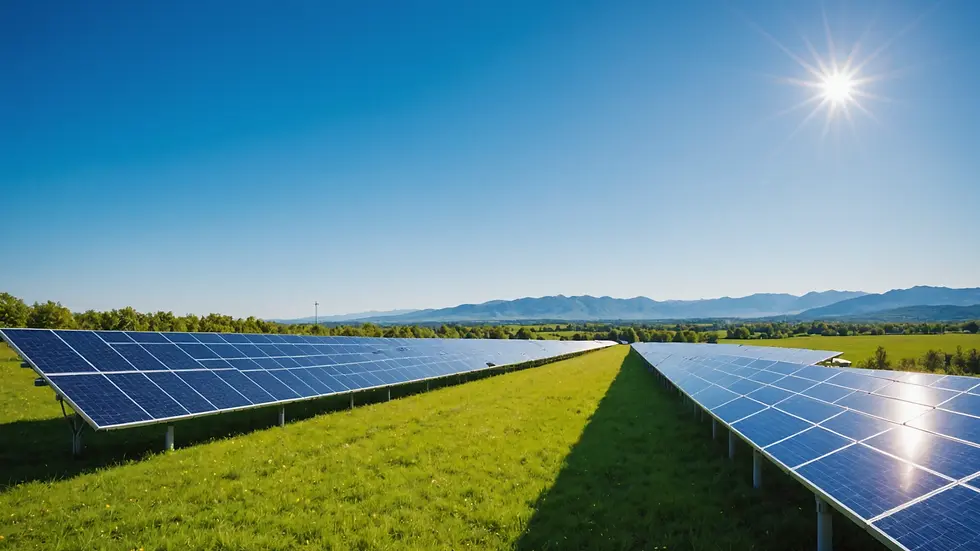Is Solar Energy the Key to Unleashing the Future Power of Business?
- tmillan2012

- Feb 27, 2025
- 3 min read
The business world is transforming rapidly, with technology and sustainability driving significant change. One energy source is leading this shift: solar energy. As companies strive to lower their carbon footprints and cut operational costs, solar energy is no longer just an option; it is essential. This article discusses how harnessing solar power can unlock opportunities for businesses of all sizes.
The Rise of Solar Energy Adoption
Over the last decade, solar energy adoption has surged significantly. For example, global solar capacity has increased from 40 gigawatts in 2010 to over 900 gigawatts in 2020. This growth is supported by technological advances and favorable government policies promoting renewable energy.
Businesses are increasingly investing in solar panels, realizing the financial advantages alongside enhanced sustainability profiles. Many companies now recognize solar energy as a long-term solution rather than a fleeting trend.

Solar Energy for Businesses is the Key to Solar Energy Transition
Cost Savings
One of the most attractive benefits of solar energy is the potential for substantial cost savings. For instance, a business installing a solar system can expect to cut electricity bills by 50% or more. Many organizations see a return on investment within five to ten years.
Moreover, generating your own electricity helps mitigate exposure to fluctuating energy prices. For example, energy costs can vary by over 20% annually, but solar energy provides stable pricing, simplifying budgeting for companies.
Sustainability and Corporate Responsibility
In an environmentally-aware market, organizations must account for their ecological impact. By utilizing solar energy, businesses can drastically reduce their carbon emissions. For example, a typical commercial solar installation can offset nearly 100 tons of carbon dioxide each year, equivalent to planting over 2,600 trees.
Furthermore, brands that demonstrate a commitment to sustainability often attract consumers who prioritize eco-friendly practices. Surveys indicate that 66% of consumers are willing to pay more for sustainable brands, highlighting the competitive advantage of going solar.

Energy Independence
Solar energy allows businesses to achieve greater energy independence. This autonomy protects against supply disruptions and enables companies to concentrate on their core functions without fearing power outages. Industries requiring high energy use, like manufacturing, benefit greatly from solar installations.
Additionally, advancements in energy storage technology make it increasingly practical to store solar power for use during peak demand, offering even more security for businesses.
Overcoming Challenges in Solar Energy Adoption
While the advantages of solar energy are clear, companies may encounter hurdles in adopting this technology due to Solar Energy misconceptions the Key is to look at the data.
Initial Costs
The upfront costs of solar installations can be a significant hurdle, especially for small and medium-sized enterprises. However, numerous financing options are available, such as power purchase agreements and leasing options, which can bring down the initial investment.
Studies show that, on average, businesses save about 20% on energy costs after the installation of solar systems, often outweighing initial expenditures over time.
Space and Location
Not every business location is suitable for solar installations. Urban areas may have limited roof space or be shaded by taller buildings. Nevertheless, community solar initiatives and solar canopies provide innovative solutions, enabling more businesses to access solar energy.
Technological Complexity
The solar energy market can be complex, with many options available for companies. From system selection to regulatory requirements, the challenges can seem overwhelming. Collaborating with experienced solar consultants can ease this process, offering tailored solutions that meet specific business needs.
The Future Outlook: A Solar-Powered Business Landscape
As businesses continue to adapt to climate change and commit to sustainability, solar energy's role will only grow. The ongoing evolution of solar technology is leading to more efficient solar panels and installations, making it easier for businesses worldwide to adopt solar energy.
Moreover, emerging storage solutions and smart grid technologies are set to enhance energy management, allowing companies to optimize their solar capabilities. As firms embrace these advancements, the benefits of solar energy will only continue to grow.

A Bright Future with Solar Energy
The future of business is inherently linked to effective energy management, and solar energy plays an essential role in this shift. By embracing solar technology, companies can bolster their financial stability while showcasing their commitment to sustainable practices.
In the evolving energy landscape, proactive businesses will enjoy essential benefits and a competitive edge. Investing in solar energy is not a mere trend; it is a vital strategy for companies aiming to succeed in a future that values sustainability and resilience.
Transitioning to solar energy today can lead to a more sustainable and empowered business tomorrow.





Comments